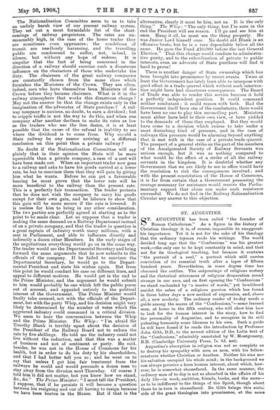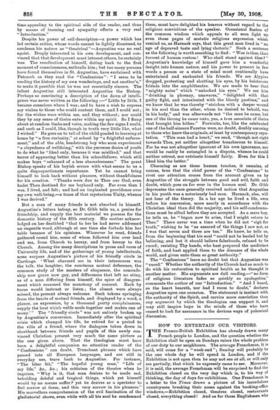ST. AUGUSTINE.
QT. AUGUSTINE has been called "the founder of Ll Roman Catholicism." As a figure in the history of Christian theology it is, of course, impossible to exaggerate his importance. Yet it is not for the sake of his theology that the ordinary layman reads his writings. The world decided long ago that the " Confessions " was his greatest work,—the only one to be kept constantly in mind, and that not for its theological teaching, but because it contains "the portrait of a soul," a portrait which still carries conviction of its essential truth after a lapse of fifteen hundred years. Nevertheless, in some degree time has obscured the outline. The outpourings of religious ecstasy and the rhetorical utterances of religious desperation sound strange in our ears, and on first opening the " Confessions " we stand enchanted by "a master of words," yet bewildered amidst the ashes of a religious passion which has found in these latter days a new method of expression, and, above all, a new modesty. The ordinary reader of to-day needs a guide among the mazes of the "Confessions,"—some learned man, at home in the fifth century, who will show him bow to look for the human interest in the story, how to find the personality of Augustine, and to recognise in its still pulsating humanity some likeness to his own. Such a guide he will have found if he reads the introduction by Professor John Gibb, D.D., to the newest edition of the Latin text of the "Confessions," admirably annotated by W. Montgomery, B.D. (Cambridge University Press, 7s. 6d. net). Augustine's absorption in religion was not so complete as to destroy his sympathy with men as men, with his fellow- creatures whether Christian or heathen. Neither his sins nor his salvation occupied his whole mind ; in the background we can always perceive a keen human interest, about which, how- ever, he is somewhat shamefaced. In the same manner, the ordinary man of to-day is not so absorbed in the affairs of his daily life—in work, ambition, friends, books, and the news— as to be indifferent to the things of the Spirit, though about those he in turn is shamefaced. Dr. Gibb brings this social side of the great theologian into prominence, at the same
time appealing to the spiritual side of the reader, and thus by means of learning and sympathy effects a very real "Introduction."
Despite his power of self-description—a power which has led certain critics, whose words cannot be lightly dismissed, to condemn his nature as "theatrical "—Augustine was no real egoist. Deeply interested in his own development, and con- vinced that that development must interest others, he certainly IVILS. The recollection of himself, dating back to the first moment of consciousness, enthralls him; but too many persons have found themselves in St. Augustine, have exclaimed with Petrarch as they read the " Confessions " : "I seem to be reading the history of my own wanderings, and not another's," to make it possible that he was not essentially sincere. The infant Augustine still interested Augustine the Bishop. Perhaps so convincing a description of the dawn of intelli- gence was never written as the following :—" Little by little, I became conscious where I was; and to have a wish to express my wishes to those who could content them, and I could not ; for the wishes were within me, and they without; nor could they by any sense of theirs enter within my spirit. So I flung about at random limbs and voice, making the few signs I could, and such as I could, like, though in truth very little like, what I wished." He goes on to tell of the child goaded to learning at home by "a free curiosity," at school by "a frightful enforce- ment," and of the able, headstrong boy who soon experienced "a cloyedness of welldoing," with the perverse desire of youth to do what he "liked only, because it was misliked," and that terror of appearing better than his schoolfellows, which still makes boys "ashamed of a less shamelessness." The great Bishop speaks of his boyish errors with what seems to us a quite disproportionate repentance. Yet he cannot bring himself to look back without pleasure, without thankfulness for his creation. "Thanks were due to Thee our God, even hadst Thou destined for me boyhood only. For even then I was, I lived, and felt ; and had an implanted providence over my own well-being,—a trace of that mysterious Unity, whence I was derived."
But a man of many friends is not absorbed in himself. Augustine's letters betray, so Dr. Gibb tells us, a genius for friendship, and supply the best material we possess for the domestic history of the fifth century. His mother acknow- ledged on her deathbed "that to her he had never addressed an ungentle word, although at one time she forbade him her table because of his opinions. Wherever he went, friends gathered round him, some of whom followed him over land and sea, from Church to heresy, and from heresy to the Church. Among the many descriptions in prose and verse of University life, and of the gatherings of young intellectuals, none surpass Augustine's picture of his friendly circle in Carthage. What charmed me in their intercourse was the talk, the laughter, the courteous mutual deference, the common study of the masters of eloquence, the comrade- ship now grave now gay, and differences that left no sting, as of a man differing from himself, the spice of disagree- ment which seasoned the monotony of consent. Each by turns would instruct or listen ; the absent were always missed, the present always welcome. Such tokens springing from the hearts of mutual friends, and displayed by a word, a glance, an expression, by a thousand pretty complaisances, supply the heat which welds souls together and makes one of many.'" The "friendly circle" was not entirely broken up by Augustine's conversion. Immediately after the spiritual crisis which changed his life, he retired for a period to the villa of a friend, where the dialogues taken down in shorthand between friends and pupils of this newly con- vinced Christian present very much the same picture as the one given above. That the theologian must have been a delightful companion no attentive reader of the " Confessions " can doubt. Trenchant phrases which have passed into all European languages, and are still in everyday use, trace back to Augustine. For instance, "The biter bit," "The hopeful young man," "Life of my life," &c., &c. ; his criticism of the theatre when he inquires, "Why is it, that man desires to be made sad, beholding doleful and tragical things, which yet himself would by no means suffer ? yet he desires as a spectator to feel sorrow at them, and this very sorrow in his pleasure." His marvellous comprehension of the evil fascination of the gladiatorial shows, even while with all his soul he condemned them, must have delighted his hearers without regard to the religious convictions of the speaker. Occasional flashes of the common wisdom which appeals to all men light up even those pages of ecstatic religious expression which remind us, as Harnack says, that this great man lived in "an age of depraved taste and lying rhetoric." Such a sentence as the following is worth searching to find : "Woe is thee, thou torrent of human custom ! Who shall stand against thee p" Augustine's knowledge of himself gave him a wonderful insight into human nature, and his power to present in few words a person or a state of mind must continually have entertained and enchanted his friends. We see Alypius dragged, protesting and shutting his eyes, by his boisterous fridnds into the amphitheatre. We are made to hear that "mighty noise" which "unlocked his eyes." We see him "drinking in phrenzy, unawares," "delighted with that guilty fight, and intoxicated with the bloody pastime," and we know that he was thereby "stricken with a deeper wound in his soul than the other, whom he desired to behold, was in his body," and was afterwards not "the man he came, but one of the throng he came unto, yea, a true associate of theirs that brought him hither." Portraits, too, like the celebrated one of the half-sincere Faustus were, no doubt, doubly amusing to those who knew the originals, at least by contemporary repu- tation. "This man had a heart," we read, "though not right towards Thee, yet neither altogether treacherous to himself. For he was not altogether ignorant of his own ignorance, nor would he rashly be entangled in a dispute, whence he could neither retreat, nor extricate himself fairly. Even for this I liked him the better."
Charming as are these human touches, it remains, of course, true that the chief power of the " Confessions " to rivet our attention comes from the account given us by Augustine of the struggle between good and evil, faith and doubt, which goes on for ever in the human soul. Dr. Gibb deprecates the once generally received notion that Augustine in his youth was a notoriously bad man. Harnack, also, will not hear of the theory. In a lax age he lived a life, even before his conversion, more nearly in accordance with the Christian ideal than did the majority, and his self-condemna- tions must be sifted before they are accepted. As a mere boy, he tells us, he "began now to arise, that I might return to Thee." There never was a time when he did not "sigh for truth," wishing to be "as assured of the things I saw not, as I was that seven and three are ten." He knew, he tells us, from the beginning that his soul "could not be healed but by believing, and lest it should believe falsehoods, refused to be cured; resisting Thy hands, who haat prepared the medicines of faith, and hest applied them to the diseases of the whole world, and given unto them so great authority."
The "Confessions" leave no doubt but that Augustine was "cured." Whether the authority of the Church had as much to do with his restoration to spiritual health as he thought is another matter. His arguments are dull reading,—" no form of religious literature fades so quickly as apologetics," comments the author of our "Introduction." "And I heard, as the heart heareth, nor had I room to doubt," declares Augustine upon one occasion. The statement is instinct with the authority of the Spirit, and carries more conviction than any argument by which the theologian can support it, and may still inspire hope in the minds of those who have ceased to look for assurance in the devious ways of polemical discussion.







































 Previous page
Previous page